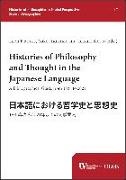Read more
Dieses bibliographische Handbuch gibt einen umfassenden Überblick über die Geschichtsschreibung der Philosophie und des Denkens in japanischer Sprache anhand einer umfangreichen und thematisch geordneten Sammlung einschlägiger Literatur. Mit über tausend Einträgen zeigt die Bibliographie nicht nur, wie umfangreich und komplex die japanische Tradition der Philosophie- und Geistesgeschichtsschreibung ist, sondern auch, wie sie strukturiert und analysiert werden kann, um sie einem vergleichenden und interkulturellen Ansatz für die Philosophiegeschichtsschreibung weltweit zugänglich zu machen. Die Literatur ist nach thematischen Schwerpunkten wie geografischen Regionen und Kontinenten, Nationen und Völkern, religiösen Traditionen und philosophischen Lehren wie Buddhismus, Islam, Shintoismus oder Konfuzianismus sowie nach Disziplinen wie Ethik, Ästhetik oder politischem Denken kategorisiert und organisiert. Die Bibliographie wird von einer Einleitung begleitet, in der die Forschungsmethode sowie quantitative und qualitative Ansätze zur Analyse des Materials dargelegt werden, gefolgt von einem chronologischen Überblick über die Geschichtsschreibung der Philosophie und des Denkens in japanischer Sprache sowie über die japanische Tradition, "Weltgeschichten der Philosophie" zu schreiben. Als erster Schritt in Richtung einer "Geschichte der Geschichtsschreibung der Philosophie" in außereuropäischen Sprachen liefert der Leitfaden nützliche Werkzeuge für eine interkulturell orientierte Wissenschaft, die auf eine nicht-eurozentrische und diversifizierte Geschichtsschreibung der Philosophie in globaler Perspektive abzielt.
About the author
KATŌ Tetsuri is a professor at the Faculty of Law, Nagoya University. He received his Ph. D. at Kyoto University in 2010, with a thesis on the political philosophy of Hans-Georg Gadamer. His current research interest lies in the methodological consideration of political thought, especially in the field of comparative political theory, which he pursues through an intercultural dialogue between Western philosophical trends trying to overcome the limits of European philosophy, and the traditions of Confucianism, Buddhism, and Shintoism in East Asia and Japan. He is now seeking to understand political thought as a “way” of life that is grounded on the unity of heaven and earth and integrates mind and body through practice.
Summary
This bibliographical guide gives a comprehensive overview of the historiography of philosophy and thought in the Japanese language through an extensive and thematically organized collection of relevant literature. Comprising over one thousand entries, the bibliography shows not only how extensive and complex the Japanese tradition of philosophical and intellectual historiography is, but also how it might be structured and analyzed to make it accessible to a comparative and intercultural approach to the historiography of philosophy worldwide. The literature is categorized and organized according to thematic focus areas such as geographical regions and continents, nations and peoples, religious traditions and philosophical teachings such as Buddhism, Islam, Shinto, or Confucianism, as well as disciplines such as ethics, aesthetics, or political thought. The bibliography is accompanied by an introduction outlining the research method as well as quantitative and qualitative approaches to analyzing the material, followed by a chronological overview of the historiography of philosophy and thought in the Japanese language as well as of the Japanese tradition of writing “world histories of philosophy”. As a first step towards a “history of the historiography of philosophy” in non-European languages, the guide provides useful tools for interculturally oriented scholarship aimed at a non-Eurocentric and diversified historiography of philosophy in a global perspective.

